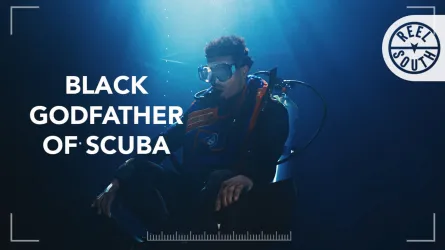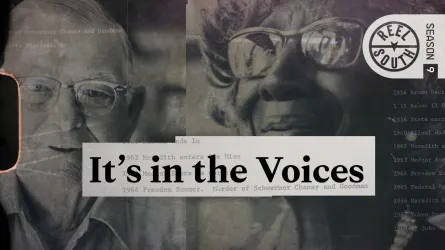'8 Days at Ware' is about a youth suicide at a Louisiana juvenile detention center that exposes a legacy of abuse. Before the Reel South premiere of the film, digital producer Heather Nunerley connected with the filmmakers Meg Shutzer and Rachel Mueller about their favorite parts of the film, updates on the subjects and more. Continue for the filmmaker feature of this week's second film 'Love Without Parole.'
This interview has been edited for clarity.
Heather: How did the film come about? How did you find your subjects?
Meg: I was reporting on a different story about the juvenile justice system when two boys died by suicide at Ware Youth Center in 2019. It’s really tragic that these two young lives were lost and it’s also shocking that something like that could happen to kids in state custody. I knew right away that I wanted to learn more about what had happened at Ware.
One of the boys, Solan Peterson, was just 13 when he died at Ware. His grandmother was looking to talk to journalists and after we talked on the phone she drove all the way down from Shreveport to meet me in New Orleans. She brought a giant framed picture of Solan with her. I invited Rachel to that very first meeting and that was the start of this film.
Heather: Can you describe the creative process and how you landed on your editing style?
Rachel: We knew we wanted a variety of storylines, things that were unfolding in the present, with the backbone of the story having happened in the past. To navigate this, we tried to create tactile devices to bring the past more into the present – for example, we filmed dust particles and suspended documents in space. We used drones, filmed from the back of a car, and followed the path of the moon to illustrate the passage of time.
Our editing style was extremely collaborative. Meg and I would each edit different sections of the film, pass the sequences off to one another, refine them, pass them off again, back-and-forth until we felt like each scene had a rhythm. We were balancing trying to fit a lot of crucial information into the film, while also having breathing space for the audience to process what is sometimes really devastating information.
Heather: Do you have any updates to share about your film's subjects that you can share with us?
Meg: We stay in frequent touch with the Petersons who have shifted their focus from the hockey rink to the softball diamond to support Solan’s little sister who is now an avid softball player. Ladarian Jackson just had a baby– which is keeping him very busy! Unfortunately there hasn’t been any movement in his lawsuit against Ware but he wrote to the ACLU and the governor asking for help. He is looking forward to having some more time this summer to ride horses.
Rachel: In addition to the film, we wrote an investigative piece for The New York Times that features Gabryell Hardy and Eleanor Morgan. Their participation in the article was incredibly brave, as our investigation goes much more deeply into the legacy of abuse at Ware Youth Center. Since finishing the film and publishing the article, Gabryell has a new job that she is excited about and is raising five kids with her partner.
Meg: Days after we published the article, Governor John Bel Edwards called for an investigation into Ware. The investigation is ongoing so we don’t have a lot of information about it but we are still trying to learn more.
Heather: What are you working on next? Anything cool to share?
Rachel: Since 2020, I’ve been directing a feature documentary with a community in rural Minnesota who have been navigating complicated questions about race after a white supremacist pagan group moved into their town. The film is tentatively called The Quiet Part and is about ancestry, identity and belonging. We’re hoping to premiere in the fall of 2024, but because we’re following events unfolding in real-time, we’ll see if that actually happens!
Meg: I’m working on an investigation that I am not ready to talk about but outside my work as a filmmaker, I’m the captain of a cycling team that is preparing for the AIDS/LifeCycle, a 545 mile bike ride from San Francisco to LA that raises money for the SF AIDS Foundation.
Heather: After watching your film, what do you hope resonates with the Reel South audience?
Rachel: I hope that people will walk away from this film thinking more deeply about what safe communities look like and what we need in order to build them. How can we support families and young people so that when things go awry, we're holding people accountable in ways that are building resiliency and community care? How can institutions support healing and restoration? These are questions I have asked myself in the making of this film that have shaped how I think about the juvenile justice system.
Meg: I hope “8 Days at Ware” spurs curiosity in parents everywhere to learn more about the juvenile justice system in their area. You may never expect that your kid will be sent there, but kids make mistakes and we need to care about these systems and places before they affect us personally. One thing I’ve heard again and again from the parents of kids at Ware is that they never felt like they got enough information about what was happening to their children there. These facilities are so opaque, ostensibly to protect the privacy of the kids inside, but the result is that we know very little about what goes on there.
Heather: Can you each tell us your favorite part of the film?
Rachel: One of my favorite parts of the film is near the end, when Bridget Peterson is holding her daughter’s hand in the car. There is tenderness in her gesture that contrasts with her voice-over when she says she doesn’t trust people like she once did. “Your boy’s going to be safe there. You believe things like that,” she says. That moment is utterly heartbreaking to me. I feel the pain of losing her son and the protectiveness she has of her daughter. To me, it’s a moment that brings up an avalanche of emotions and points directly at the tragedy of Solan’s death.
Meg: My favorite part of the film comes about 17 minutes in when we hear from former Ware guard, Eleanor Morgan, along with Gabryell Hardy and Ladarian Jackson who were sent to Ware as children. They describe the abusive treatment at Ware with similar language, echoing and building off each other. This sequence culminates in the message that Gabryell received from a guard about choking her at Ware. It lands really powerfully for me, like a kind of undeniable proof that they are telling the truth. I always feel an immense amount of gratitude towards the three of them when I watch that part. They were really brave and principled to come forward.

'Love Without Parole' is about an Alabama inmate who fights to keep a jailhouse romance alive while advocating for his freedom. Filmmaker Greg Womble highlights the unique relationship in the film and before the Reel South premiere, our digital producer Heather Nunerley connected with him on the details of making the film.
This interview has been edited for clarity.
Heather: How did the film come about? How did you find your subjects?
Greg: My co-producer for the film, Elaine Witt, heard about this story by chance through Carla Crowder, the executive director of Alabama Appleseed. Appleseed is a nonprofit law center that had been making headlines by winning the release of older inmates who had been serving unjustified life-without-parole sentences for decades in Alabama prisons. Carla mentioned that Appleseed was putting on a wedding for one of its recently released older inmates. Elaine used to be a newspaper journalist, so she knows a good story when she hears it. She called me one day and said, “I’ve never made a documentary film, but I think this would be a good one.” She was right, and we went to work.
Heather: After watching your film, what do you hope resonates with the Reel South audience?
Greg: We hope “Love Without Parole” will resonate with Reel South audiences on several levels. The love story aspect, for sure. Like in a rom-com, Michael and Kathlyn met cute, fell in love, had challenges, and somehow got through them. But all of that was taking place while 60-year-old Michael was fighting for his life in Alabama’s wretched prison system, destined to die there for relatively minor, non-violent crimes that happened when he was barely out of high school. By sharing Michael's story, we hope to show how human potential is wasted through an unjust and illogical system of mass incarceration.
Heather: Can you describe the creative process and how you landed on your editing style?
Greg: I guess I’m drawn to documentary filmmaking partly because when I see a bunch of shiny, bite-sized bits of truth and light lying around, I become intrigued as to how they might all be pieced together to tell a story. I’m not an activist, so I knew I didn’t want to do a straight-up advocacy piece about Alabama’s horrible prison problem. But I am a sucker for a love story. And the more Elaine and I talked about how to shape this film, the more we realized that maybe it could become a combination of both.
Good collaborations are both rare and beautiful, especially when you are able to create a shared vision with your partner that you can’t really describe to others but know is real and right. Elaine and I were only casual acquaintances before this project, and now we finish each other’s sentences. She taught me a lot about storytelling and how to deal gently and kindly with subjects.
I’m primarily a writer, so unlike some filmmakers, we didn’t go into the editing process until we had a pretty nailed-down script. Our editor, Joe Walker, would do a first cut of a section of the film, then Elaine and I would go to his house and add our two cents. Then he would provide another cut, and so on. We trusted the script but also trusted Joe; he helped us allow room for new ideas and nuance that we just couldn’t see previously.
Heather: Can you each tell us your favorite part of the film?
Greg: It’s been so cool to see our subjects, Michael Schumacher and Kathlyn Sprague, get to a good place in their lives after a 30-year relationship that survived a lot of rough seas. They are finally living as a married couple in Montclair, NJ and, after 36 years in prison, Michael is contributing to society and rebuilding his life.
Category
Share


